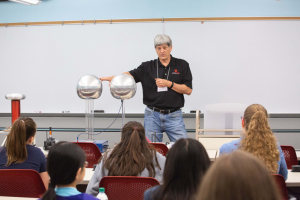IEEE Antennas and Propagation Society recognizes Stuart Long for his ‘commitment to electromagnetics education.’
Stuart Long, Cullen College professor of electrical and computer engineering and Associate Dean of the Honors College and Undergraduate Research at the University of Houston, received the 2018 Chen-To Tai Distinguished Educator Award from the IEEE (Institute of Electrical and Electronics Engineers) Antennas and Propagation Society (AP-S).
The organization recognized Long for “his commitment to electromagnetics education through teaching, research and the development of programs to attract students into electromagnetics and engineering.” The award was created in 2000 to recognize outstanding career achievements by an educator in the field of antennas and propagation.
“Based on his mentoring at both the undergraduate and graduate level, [Long] is without a doubt most deserving of the Chen-To Tai Distinguished Educator Award,” wrote Joseph W. Tedesco, Elizabeth D. Rockwell Dean and Professor of the Cullen College of Engineering, in his recommendation letter.
While winning the Chen-To Tai award is a great honor to any educator in the field of applied electromagnetics, the award brings Long full circle to his roots and is personally meaningful to him.
Long met Professor Tai, a renowned scientist in electromagnetics and antenna theory, at Harvard University. Tai, who was a longtime professor at the University of Michigan, Ann Arbor, was on a sabbatical and teaching at Harvard at the time.
“I obviously admired his intellect, but he was always a gentleman…a really nice person who would just sit and talk to some lowly grad student like me,” Long said. Once he graduated and started working as a professor, Long attended some of the same conferences as Tai – they continued talking and even became tennis partners. They went onto co-author a chapter in the classic text, Antenna Engineering Handbook.
In addition, both Tai and Long had been Ph.D. students of Professor Ronold W. P. King – a Harvard professor famous for his contributions to the theory and application of microwave antennas – who won the first Chen-To Tai award in 2001.
For Long, winning this award was an homage to his academic family. “Anytime you get an award like this, it’s really due to all the people who mentored you to this point,” he said. “I have had some great mentors.”
Long has been teaching and researching at UH since the 1970s and has spent years creating a thriving culture of undergraduate research, mentorship, and achievement.
He oversaw the expansion of three mentoring undergraduate research programs on campus — a full-time summer program (Summer Undergraduate Research Fellowship or SURF), a part-time semester program (Provost’s Undergraduate Research Scholarship or PURS) and the undergraduate senior honor thesis program. Under Long’s leadership, the Office of Undergraduate Research recently developed the Houston Early Research Experience (HERE), a two-week workshop designed to familiarize rising sophomores and juniors with the fundamentals of conducting research.
He has also done other outreach and helped develop faculty-led lectures, workshops, and panels on topics like finding a research position, being a responsible researcher, pursuing graduate school, and applying for scholarships.
In 2002, Long was asked to help the Cullen College of Engineering provide opportunities for young women and other underrepresented students to explore STEM careers.
“He answered ‘Yes’ without hesitation to the request, and took a huge risk with his professional career as the time and effort involved…would divert much of his attention from his technical research,” wrote Tedesco. “I am proud to say that his efforts have blossomed into an extensive infrastructure of activities.”
Long worked with Cullen College Professor Fritz Claydon – also the director of the division of undergraduate program and Student Success – and others on these activities. Their projects include GRADE Camp, an annual engineering camp for girls in grades 8-12; academic excellence workshops in more than a dozen courses for students; summer research opportunities for engineering undergraduates from across the country; research opportunities for K-12 teachers in engineering laboratories during the summer – which garnered them the White House Award for President’s Higher Education Community Service in 2013 – and GK-12, a program bringing science and engineering graduate students into area schools to foster greater interest in science and engineering among economically disadvantaged students.
Long’s efforts have garnered the University about $20 million in funding from a total of 89 grants, of which 21 were from the National Science Foundation.
At the University of Houston, Long has won almost every faculty honor there is including the Esther Farfel Award in 2010 – the highest honor a UH faculty member can receive – and the Fluor Daniel Award – the top career award given by the College. Long was also the first recipient of the UH Career Teaching Excellence Award.
His research interests are in the broad area of applied electromagnetics and wireless communications, and more specifically in microstrip and dielectric resonator antennas.
He became an IEEE Fellow in 1991, won the IEEE Third Millennium Medal in 2000 and received the organization’s Life Fellow status in 2010 – a designation given to those with “an extraordinary record of accomplishments in any of the IEEE fields of interest.” He also received the IEEE AP-S John Kraus Antenna Award in 2014 for creating the dielectric resonator antenna, an antenna which is completely composed of non-conducting materials, and is exceedingly efficient at very high frequencies.
Long credits the diversity of his work – teaching, research, administration and more – for keeping him engaged and invested in his 44-year-career. Several of his students and academic hires have already retired, but it’s not something that appeals to him.
“I keep doing it because I enjoy it,” he said. “As long as I’m in good health and having fun, I plan on continuing. If I had [the opportunity] to do it over, I’d maybe do some things slightly different…but I’d always end up being a professor – I think that’s the best job you can have.”
